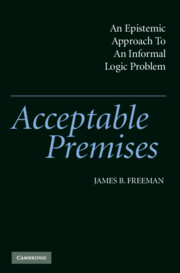Book contents
- Frontmatter
- Contents
- Preface
- Acknowledgments
- PART 1 ACCEPTABILITY: DIALECTICAL AND EPISTEMOLOGICAL COSIDERATIONS
- 1 Why Do We Need a Theory of Acceptability?
- 2 Acceptability and Presumption
- 3 Factors Determining Presumption: Basic Considerations
- 4 Epistemological Considerations: Acceptability, Deontology, Internalism, Justification
- PART 2 STATEMENTS, BELIEF-GENERATING MECHANISMS, AND PRESUMPTIVE RELIABILITY
- PART 3 PRACTICE AND PERSPECTIVE
- Notes
- References
- Index
4 - Epistemological Considerations: Acceptability, Deontology, Internalism, Justification
Published online by Cambridge University Press: 02 December 2009
- Frontmatter
- Contents
- Preface
- Acknowledgments
- PART 1 ACCEPTABILITY: DIALECTICAL AND EPISTEMOLOGICAL COSIDERATIONS
- 1 Why Do We Need a Theory of Acceptability?
- 2 Acceptability and Presumption
- 3 Factors Determining Presumption: Basic Considerations
- 4 Epistemological Considerations: Acceptability, Deontology, Internalism, Justification
- PART 2 STATEMENTS, BELIEF-GENERATING MECHANISMS, AND PRESUMPTIVE RELIABILITY
- PART 3 PRACTICE AND PERSPECTIVE
- Notes
- References
- Index
Summary
Let us recall this point: Acceptability is a normative, not a descriptive notion. Acceptability does not amount to acceptance. It is no synonym for marketability. As we understand the notion, to say that a statement or claim (on our belief) is acceptable for a given person is to say that it is proper, correct for that person to accept it, that is, take it as a premise for further deliberation or action. One way to put this is to say that one is within one's epistemic or doxastic rights to accept that statement; one's acceptance violates no epistemic or doxastic duty. One is epistemically justified in accepting the statement.
In our explication of normativity in the last paragraph, we have made contact with other normative notions – epistemic rights and duties, being epistemically justified. These notions have received detailed development in epistemology. Has this development placed certain constraints on these notions and does our notion of presumption, that is, presumption of warrant together with satisfaction of the pragmatic condition, fall within those constraints? What does it mean to be within one's epistemic rights or to have done one's epistemic duty or to be epistemically justified, and is one within one's epistemic rights to accept a statement if there is a presumption of warrant in its favor and the pragmatic condition is satisfied? Must acceptability be connected with epistemic rights and duties to be a normative concept? Could it be connected simply with epistemic justification?
- Type
- Chapter
- Information
- Acceptable PremisesAn Epistemic Approach to an Informal Logic Problem, pp. 73 - 90Publisher: Cambridge University PressPrint publication year: 2004



